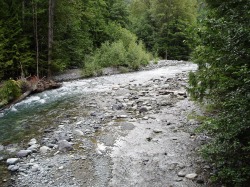Travel Tips

As most of the areas in the outdoors are of rustic or wilderness setting.
*Cell phone communications or public phones are usually not available at many wilderness locations, thus a satellite phone is recommended for emergencies
*If you get lost, stay in the area that you are. Rescuers have a lot better chance of finding you if you are in the same place, then if you move a lot.
*Leave a plan of your expected arrangements with a responsible family or friend of where you plan on going, and your expected arrival at home or civilization.
*Wildlife can be encountered at anytime through the parks, and other areas of BC. Please respect their space, and remember that they are wild, and unpredictable, and can cause major damage.
*If going into a mountainous area, be aware that weather changes may occur often, and even in the summer you can experience snow, or wintry weather. Also in higher terrain, please don't trample on vegetation as there is a short growing season.
*Practice NO TRACE camping in wilderness areas.
*Make it a place for everyone to be able to enjoy! If you have to cross a creek or river crossing, be very careful of your footing. Also, if you can, make like a rope across. Also, if you can, wear a life jacket as well when crossing any water crossing.
*Make sure to loosen your backpack before crossing.
*Most of these wilderness settings are via forest service roads, and can be very busy with industrial traffic. Please yield.
*Know the fitness and physical abilities of every member in your group.
*Be sure to pace yourself according to the slowest member of the group.
*If you have to go along avalanche terrain during the winter time, be sure to go one at a time, and also DO NOT attempt if you haven't had at least 2-3 members of your group with avalanche experience. Also, make sure that everyone in the group knows how to use avalanche beacons. If there are at least 2-3 members who have the training, then have one go at the back of the group, one in the middle, and one at the beginning of the group.
*Only experienced and trained individuals should attempt going on the ice fields, or glaciers, or caving that are located in the pristine wilderness.
*Before you boat in a pleasure craft -- be sure that you carefully read and heed the advisements of any precautions or suggestions of tides, warnings, level of capability, etc. DO NOT attempt unless you have read thoroughly all of the warnings and precautions.
*There are usually NO lifeguards at any parks, so you must be proficient at swimmng and DO NOT attempt to swim in areas of strong currents or undertows.
*When hiking in areas that have no designated trails, ensure that you keep watch of footing, and of fallen branches or any other hazards that may be present.
*Watch for warnings posted regarding wildlife. For example, if there is a posting that says the area is closed for bear *feeding etc.,DO NOT go against the warning.
*DO NOT feed any wildlife, and watch for wildlife on the roadways where forestry roads, highways etc. go through the parks.
*If you have a campfire, or other fire, make sure that you FULLY EXTINGUISH before you leave.
Please note, the above are just a few of the reminders in areas of wilderness.
Please consult with appropriate websites for more information and specific information, regarding the specific area that you are traveling!!!!
